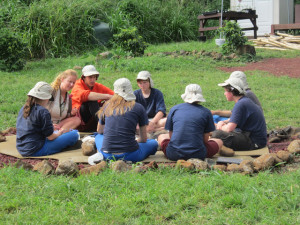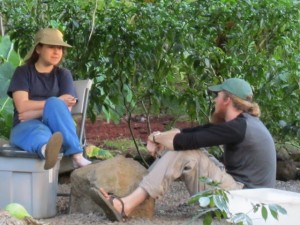By Matt Armstrong, Recruitment Manager
 As the Recruiter at Pacific Quest, I speak to potential Program Guide applicants and current staff on a daily basis. I’m often asked a variety of questions from those interested in applying or currently working in this position. As the recruiter, I can’t help but want to spend extra time to answer the most common question, “Matt, what is it really like being a Program Guide and what are you looking for?” The answer to this can be long winded, and has elements of my own observations and experiences intertwined. I encourage people to first check out our updated website, which is full of information (including videos) of our therapeutic model. The great part is, having been a Program Guide myself at Pacific Quest for over a year, I’m in the unique position to share some specific examples. With this in mind, I’ve decided to use this space to dive a little deeper into the amazing job of Program Guide, including some wisdom from co-workers past and present.
As the Recruiter at Pacific Quest, I speak to potential Program Guide applicants and current staff on a daily basis. I’m often asked a variety of questions from those interested in applying or currently working in this position. As the recruiter, I can’t help but want to spend extra time to answer the most common question, “Matt, what is it really like being a Program Guide and what are you looking for?” The answer to this can be long winded, and has elements of my own observations and experiences intertwined. I encourage people to first check out our updated website, which is full of information (including videos) of our therapeutic model. The great part is, having been a Program Guide myself at Pacific Quest for over a year, I’m in the unique position to share some specific examples. With this in mind, I’ve decided to use this space to dive a little deeper into the amazing job of Program Guide, including some wisdom from co-workers past and present.
There will always be an unknown:
You could spend an entire day speaking with current staff, observing and meeting people in the field. In the end, you would only have a small glimpse into what the day-to-day tasks and situations a Program Guide would encounter in this position. Because of this, being a Program Guide requires a great sense of adventure, flexibility and adaptability. I will never forget my first day out in a camp–I immediately burnt 5 pounds of oatmeal, had a group of teenagers laugh at me because I thought basil was cilantro and confused the lua (bathroom) with luau (traditional Hawaiian word for party or feast). Despite everything that was happening that first day, I felt comfortable. I can only attribute that comfort to my experience traveling for extended periods of time, being out of my comfort zone and adapting to a variety of situations culturally and logistically. Having experiences where you’re pushed out of your comfort zone, will greatly benefit you for this position. It also allows us to acknowledge what it’s like to be in the student’s shoes when first arriving to this new environment.
Making a 1 year commitment to living on the most isolated landmass in the world:
This too requires adaptability. A one-year commitment can present a deeper challenge than expected. Getting caught up in the magic of Hawaii can often make you overlook what it takes to fulfill an extended commitment in such a distant location. Some may struggle not being able to see family, friends and the sudden parting of a support system. Yes, this is another great opportunity to relate in that “out of comfort zone” experience a student may go through. I found the best way to overcome this change is to start creating bonds with both people and the land. This process is one of those big growth moments for staff and can happen quickly or over time. I hit this phase at 7 months, and looking at pictures of my friends and family on Facebook was not helping the situation. With the advice from a Supervisor, I chose to address this and make a positive change. First thing on the list was to find a hobby. I didn’t realize that I was living my life like a tourist for 7 months–never really creating structure and setting down roots. I tried spear fishing and absolutely loved it. Although I was not great at it at, having island friends join me gave me that true sense of community I was striving for. Second on the list was to stop talking about work on my days off. After every shift, Program Guides have a “de-brief”. This is an important time to hear and give feedback with the staff team, and even more importantly process the week and leave everything at work. I had some rough ones, my boundaries were pushed and my skills were tested. I made it through every shift stronger and more confident in my abilities. During a few off -shifts I made the mistake of continuing my processing outside of work with staff. It felt as though I never left the field, cleared my mind, or hit the “refresh” button. Learning from this was very important, and to be a successful staff, being aware of your own sustainability and what you need to be healthy is essential in providing continuous top-level care for the students.
A BIG heart is the greatest qualification:
Yep, the job is in Hawaii and there is always reason to celebrate such an opportunity if offered. At the same time, our Program Guides have so much more driving them than  a change in location or better weather. It is a requirement that staff have a passion for helping “at risk” teens or young adults. This passion directly reflects to the experience and positive growth of our students and cannot be faked. Staff’s deep investment and selflessness allows them to work long days, spend extra time checking in with a struggling teen or young adult and setting up daily therapeutic goals with students. Furthermore, this passion drives them to continuously hold healthy boundaries, maintain safety, empower students, think creatively, and share in the success of the individual and community. As a staff working with a student who would arrive in our first stage Nalu (reflection) and later working with the same student in the final stage of Ohana (family), witnessing a student’s growth was inspiring. Because of the heart and dedication of all program staff, this progress in students is continuous and seamless. I still get that warm fuzzy feeling reflecting on those I directly impacted. Having a hand with a group of cheering teenagers as they celebrate the sight of a single red tomato, running to plant more for themselves and future students only further validated my hard work, and made the heart grow bigger.
a change in location or better weather. It is a requirement that staff have a passion for helping “at risk” teens or young adults. This passion directly reflects to the experience and positive growth of our students and cannot be faked. Staff’s deep investment and selflessness allows them to work long days, spend extra time checking in with a struggling teen or young adult and setting up daily therapeutic goals with students. Furthermore, this passion drives them to continuously hold healthy boundaries, maintain safety, empower students, think creatively, and share in the success of the individual and community. As a staff working with a student who would arrive in our first stage Nalu (reflection) and later working with the same student in the final stage of Ohana (family), witnessing a student’s growth was inspiring. Because of the heart and dedication of all program staff, this progress in students is continuous and seamless. I still get that warm fuzzy feeling reflecting on those I directly impacted. Having a hand with a group of cheering teenagers as they celebrate the sight of a single red tomato, running to plant more for themselves and future students only further validated my hard work, and made the heart grow bigger.
Great advice from co-workers:
“Dude, get dirty”
So simple, but not always the first instinct. Putting your hands through a mound of freshly sifted soil, and having others join you is a genuine therapeutic moment. It often resulted in a great silence. A connection with the land that just can’t be explained.
“Stressed?, try this”
Grab a bunch of mint and breathe. I never thought that “putting things into perspective” had a smell, it does, and it’s mint. This quick action made me realize how something so simple as bush mint can provide such a jolt to the senses. Different reactions come from doing this depending on the individual; almost all result in focus switching to what is happening in that moment of bliss.
“We are all equal”
Pacific Quest staff work hard to not have a perception of being intimidating or above anyone else. If not presented warmly, our body language and tone can often result in defensive reactions by those around us. Being mindful of this, means taking those extra steps to meet every person respectfully and fully ready to listen to him or her. If someone is sitting, take a seat next to them. It may be bright outside, but removing your sunglasses and making eye contact with someone can mean the difference in that individual opening up or closing off. Go beyond helping with the land, volunteer to do a student’s task, put your own name on the chore board. This will only help with preconceived notions of what a Program Guide might be.
“Take ownership”
No staff is perfect, learning and growing together is part of the process. Taking ownership for even the smallest things in the field says a lot to those around you. Not immediately realizing I over-harvested the pepper plant the shift before, I once had to announce to all the students that I was responsible for not having the much-anticipated salsa for the week. Expecting the worst in making the announcement, I was surprised when students thanked me for owning up to it. What resulted, was a group led by the students on “accountability”. It was of course then, I also realized I’d forgotten to grab avocados to make guacamole for the night.
“Laugh”
It really is the best medicine. Laughing alone is okay, laughing as a group, even better. Create space to laugh or giggle everyday. Starting the morning with a smile and laugh can really set the mood.